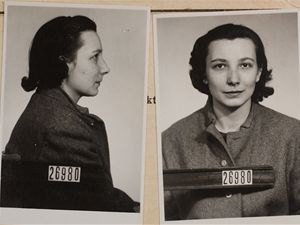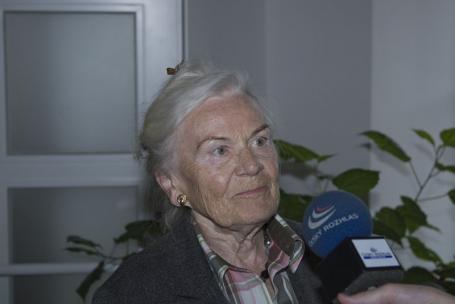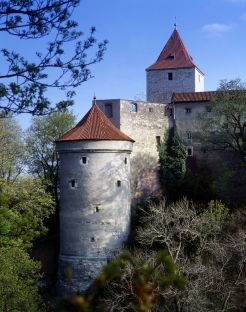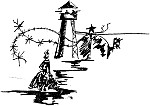
-
The next horror came, when we were looking for a doctor to take care of our mother
- Category: The Daughters' Stories
-
In 1951, my parents Bedřich and Jarmila Koller, and my seventeen year old sister were factory workers in Uherský Brod. We, the two younger sisters, Jarmila and Věra were still in elementary school.
Our father was a member of the National Socialist Party, not to be confused with the German Nazi party, that was not popular with the Communists. That is why, during the school summer holiday in 1951, men in leather coats came to our home (they must have inherited the coats from the Gestapo) and walked away with our father. Their excuse was that they needed some information from dad. They arrested other members of that party in our town as well.
The next morning, our mother and sister were not allowed to enter the factory. The doorman announced to them that their work contract was abolished. Not one of the factory bosses had the courage to explain to our mother the reason she could not work there anymore.
-
After her arrest, Miluška Havlůjová did not see her baby for 2 years
- Category: The Daughters' Stories
-

Miluška Havlůjová (Pomplová) was born into a patriotic Czech family in 1929. She was a fashion model and she also worked as an office clerk. Her parents joined the resistance movement in their area of Rožmitál pod Třemšínem during the WWII German occupation of Czechoslovakia. Her mother was arrested by the Gestapo in 1944, but miraculously survived in the Terezienstadt fortress. Her father managed to hide until the end of WWII.
-
My grandmother is a very devoted Communist.
- Category: What you wrote to us
-
Dear Daughters,
After I read about you in Reflex magazine last Sunday, I could not resist sending my opinion to you. The main point for me was that some of you question (at least that is what I understood) whether speaking about the 1950s is worth it. Or would forgetting about the past be a good thing for everyone, as the son of one of you expressed.
-
Hana´s Christmas Wish
- Category: The Daughters' Stories
-

-
My prison image was formed by the legends of Middle-Ages Daliborka
- Category: Children of the Others
-
Helena Goldstuckerova — Vavrova
What is your most pleasant memory from childhood?

There are many until they arrested dad. The best one was when he returned home, and we had our first Christmas together.
What do you think was the worst moment?
The worst was, (long pause) when they imprisoned daddy. I was four and a half and nobody told me anything. Before I started 1st grade, mom decided to tell me because she was afraid that I would find out from somebody else. I cried a lot when mom told me — I never told this to anyone — because when I was a child the prison image was formed by the horrid legends of Daliborka http://www.prague.net/daliborka .
-
Everybody is responsible for one’s luck, but totalitarians are responsible for misfortune of others.
- Category: The Daughters' Stories
-
Or — every story has its prologue.
The story of our family, persecuted during the communist era, is like a story of thousands of individuals and their families. The prologue of those family tragedies goes back to the 1930s when our future communist president Gottwald said in the Parliament, „ We Communists go to Moscow to learn how to break your neck. “
-
Stalin – my temporary father
- Category: The Daughters' Stories
-
 When I was in first grade, I saw a photograph of a girl who looked
to be about seven. She had blond curly hair and Stalin was holding her next to him, dressed in his generalissimo uniform, with
many medals on his chest.
When I was in first grade, I saw a photograph of a girl who looked
to be about seven. She had blond curly hair and Stalin was holding her next to him, dressed in his generalissimo uniform, with
many medals on his chest.
-
I grew up in the shadow of the Holocaust
- Category: Children of the Others
-
I was born into a family that hid in different locations in Slovakia during World War II. My parents succeeded hiding with their little girl thanks to false documents showing they were not Jewish. But in 1943, someone informed on them and they were deported to the Terezienstadt concentration camp. When the war was over, the return home was not a happy one. On my mom’s side she was the only one who came back. In my dad’s family, two of his brothers survived the war; one fought with the Slovak partisans and the other with a Western army.
-
Reflections of Prague: Journeys through the 20th century
- Category: Children of the Others
-
Ivan Margolius

On returning to Prague I imagined I had seen my father. His slim figure, elegantly dressed in a dark single-breasted suit, white shirt and blue tie appeared in the distance. He paused at Knihy bookshop in Na Příkopě Street to look inside and check his reflection in the shop window. His hair was swept back, the receding hairline exposing his high forehead. Rimless spectacles framed his grey eyes, glinting in the bright morning light. The permanent smile on his lips, which I so loved, was still there. He checked the time on his Omega watch, lit a cigarette and walked on. Pushing through the crowd, I hurried to catch him but he disappeared into the darkness of Prague's many passageways that criss-cross the inner city. l delved into the labyrinth of shadows to search for him.
-
The secret police kidnapped me when I was a baby
- Category: Children of the Others
-
Jarmila remembers:
“After they arrested our parents, my brother ended up in a children’s institution and I was kidnapped by the security police and placed with a couple somewhere in the mountains. Because they changed my last name. my relatives had a hard time to find me. I didn’t have many relatives; most died during the Holocaust.